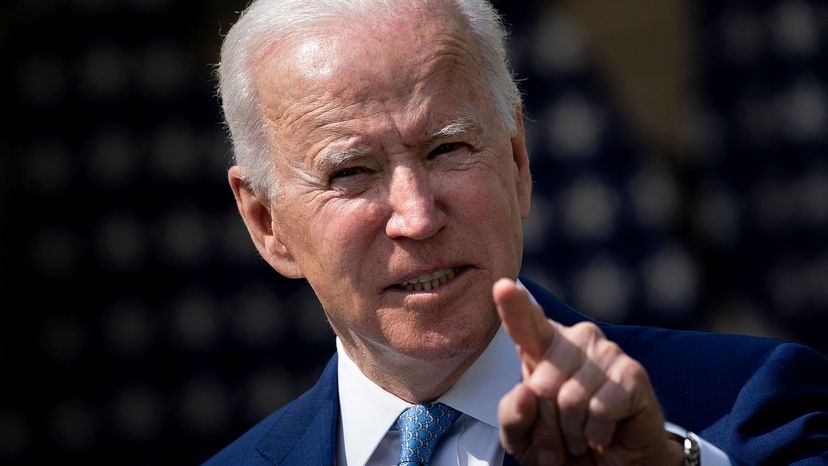
Image: RENDAN SMIALOWSKI/AFP via Getty Images
About This Quiz
Americans are conditioned to believe that the Constitution created a system of checks and balances that preserves their rights and gives all equal standing in the law. But, if you follow politics long enough, there'll be headlines that make you wonder if a U.S. president can really do that thing you just read about. Take our quiz to learn what's within a president's rights.
True or false: It is completely legal for U.S. presidents to secretly record White House conversations.
true
Laws regarding secretly recording conversations (called "one-party consent") vary from state to state. However, the District of Columbia allows the practice, meaning the president can certainly record anything he wants ... even if doing so comes back to haunt him.
false
The law isn't clear on this matter.
Since 1976, how many times has a U.S. president called a State of Emergency?
0
13
77
The National Emergencies Act was enacted in 1976 and has seen vigorous use by many presidents. As of April 2021, presidents have declared 77 national emergencies.
If a president declares a national emergency, how long can the emergency legally remain in effect?
6 months
12 months
indefinitely
National emergencies can drag on indefinitely. Of the 77 emergencies declared since 1976, 40 are still active.
Advertisement
Let's say the president bans a specific reporter from attending White House press conference. What sort of rule does this violate?
There's no definite rule on banning journalists.
Relationships between the White House and reporters are often frosty. Only in the rarest cases have journalists been banned from press conferences, and that partly why it's unclear as to whether such restrictions are unconstitutional or illegal.
It's completely illegal to ban journalists.
The Constitution allows the president to ban journalists who consistently report negative stuff about him.
Which president unilaterally suspended the writ of habeas corpus, the process through which a person holding someone in custody must deliver the imprisoned individual to a court?
Richard Nixon
Abraham Lincoln
During the Civil War, Abraham Lincoln took the bold and extremely controversial move of suspending habeas corpus, essentially giving the Union Army the ability to arrest and imprison just about anyone without a warrant and without a trial. And Lincoln did so in direct defiance of the chief justice of the Supreme Court, who said the president was clearly overstepping his bounds.
Donald Trump
Which of these presidents invoked executive privilege in order to get out of a sticky legal situation?
George Washington
Richard Nixon
Bill Clinton
all of them
Executive privilege means a president can withhold information from Congress, the courts, etc. "in the public interest." This right is not spelled out in the Constitution but many presidents (including the three listed here) have invoked it especially when faced with a subpoena.
Advertisement
If a new president attempts to pardon a former president for criminal offenses that his predecessor conducted while in office, what happens?
He's not allowed to do that.
The pardon is granted.
President Richard Nixon resigned in disgrace after being implicated in a vast array of alleged criminal activities. Vice President Gerald Ford immediately became president and pardoned him for any criminal actions that Nixon may have committed, sparing Nixon from indictment. The pardon may have cost Ford re-election.
He can pardon him, but authorities can still bring criminal charges.
In a time of labor strife, can a sitting U.S. president simply take over an entire industry and place it into federal hands?
yes
no
In 1952, looming strikes in the steel industry threatened America's capabilities in the Korean War, so President Harry Truman took things into his own hands, nationalizing the entire industry. The Supreme Court ruled that the president absolutely did not have the power to simply step in and take over private companies.
It's unclear.
Executive orders are a way for presidents to exercise power without congressional approval. How many executive orders can a president sign during a term in office?
10
no more than 100
unlimited
As far back as George Washington, U.S. presidents have used presidential declarations or executive orders to impose their polices. There's no limit to how many a president can sign, and Franklin Roosevelt holds the record, having signed 3,721 orders during his long stay in office.
Advertisement
Can a president declare war unilaterally?
yes
no
only if there is an urgent situation
The U.S. Constitution says only Congress has the power to declare war, unless there is an emergency situation. But that hasn't stopped many presidents from authorizing troops be deployed to various countries. Justifications for this range from calling the deployments "police actions" to pointing out that the president is the commander- in-chief of the troops.
You Got:
/10
RENDAN SMIALOWSKI/AFP via Getty Images